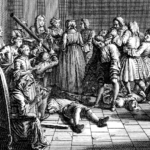 Juliane Engelhardt, Univ. of Copenhagen (Web)
Juliane Engelhardt, Univ. of Copenhagen (Web)
Time: 15.-17.05.2024
Venue: Copenhagen
Proposals by: 05.04.2024
The purpose of this seminar is to elucidate and discuss perceptions of gender in radical Christian movements in the Early Modern Era. The organizers wish to bring together researchers from different parts of Europe, thereby pursuing a transnational and trans-confessional approach. The aim is to investigate similarities and differences in narrative patterns, rhetorical strategies and practices, which surrounded alternative perceptions of gender in radical religious communities. Early modern scholarship has long had an interest in women’s participation in religious communities. Especially in radical religious these communities, such as the Quakers and radical Pietist, women were not only numerous, they also often took leading roles as organisers, prophets or mystics with immediate connections to a divine being.
Furthermore, in recent years there has been an increasing focus on how women and men developed coherent theological interpretations, where femininity and different notions of gender were prominent and provided real alternatives to established theology. Still, Jacob Böhme’s Theosophy and various representations of „Sofia“ needs further exploration. Other sources suggest that androgynous notions of Christ and prelapsarian Adam existed, but we still don’t know how widespread they were. Strategic readings of the Gospel, which historicised passages that restricted women and conversely universalized female-affirmative passages, also need further investigations.
This seminar will bring together researchers at the forefront in the field. Presentations can address one or more of the following topics and questions:
Participation: “Radical” is a modern term, which today is often used to designate believers, who in the Early Modern Era were nicknamed enthusiasts, quakers, separatists, atheists etc. What do we mean when we use the term, and which groups and convictions do we understand as radical? To what extent did men and women, who were marginalized by state churches and official theology, establish contact across countries and confessions? Did radical religious communities emulate discourses on gender from other religions or other denominations? Read more and source … (Web)
